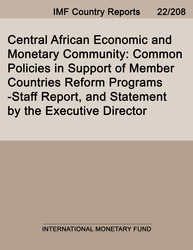
Central African Economic and Monetary Community: Common Policies in Support of Member Countries Reform Programs-Staff Report, and Statement by the Executive Director
Central African Economic and Monetary Community: Common Policies in Support of Member Countries Reform Programs-Staff Report, and Statement by the Executive Director
READ MORE...
Volume/Issue:
Volume 2022
Issue 208
Publication date: July 2022
ISBN: 9798400211942
$20.00
Add to Cart by clicking price of the language and format you'd like to purchase
Available Languages and Formats
| English | |||
| French |
Prices in red indicate formats that are not yet available but are forthcoming.
Topics covered in this book
This title contains information about the following subjects.
Click on a subject if you would like to see other titles with the same subjects.
Finance , Inflation , Economics- Macroeconomics , Money and Monetary Policy , Public Finance , International - Economics , CEMAC authorities , Policy recommendation , liquidity management framework , CEMAC member states , recapitalization procedure , monetary policy tightening , Oil prices , Fiscal stance , Liquidity , Inflation , Global
Also of interest
Summary
This paper discusses Central African Economic and Monetary Community’s (CEMAC) Common Policies in Support of Member Countries Reform Programs. CEMAC ended 2021 in a fragile external position, with gross reserves at only 2.7 months of prospective imports and net foreign assets at their lowest level in decades, despite the availability of Fund financing, the SDR allocation, and monetary policy tightening. The terms of trade shock this year is expected to be broadly positive for CEMAC. This more favorable outlook is, however, subject to heightened external uncertainties associated with the fallout from the war in Ukraine, faster-than-anticipated global financial tightening, possible emergence of new coronavirus disease strains and risks from crypto-assets. This report suggests to seize the opportunity offered by high oil prices to rebuild both fiscal and external buffers. Social safety nets should be strengthened to protect vulnerable populations from the effects of soaring energy, food, and fertilizer prices. The paper also recommends to normalizing the prudential framework by end-June 2022 as planned and ensures that banks account for sovereign risk adequately.
Copyright © 2010 - 2026
Powered by:
AIDC



